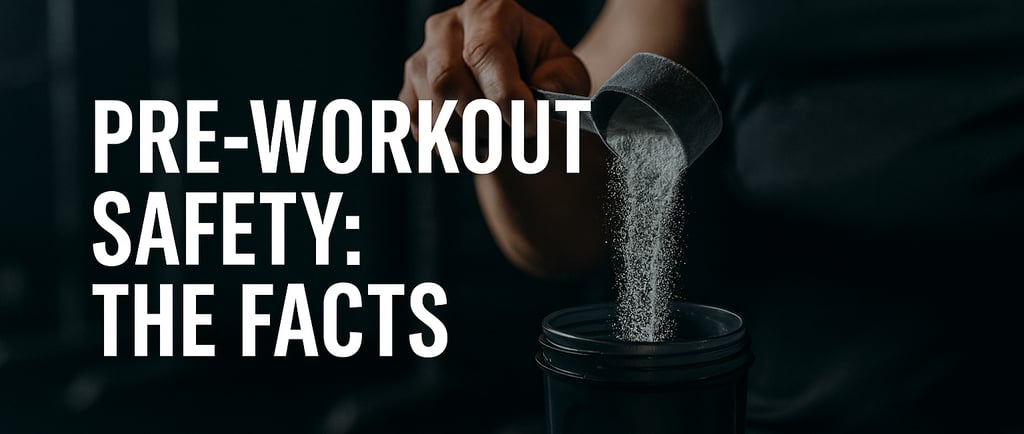Are Pre-Workout Supplements Safe? | Expert Guide
The Truth About Boosting Energy and Performance Pre-workout supplements are one of the hottest products in the fitness industry. Whether you’re a seasoned bodybuilder or just starting your gym journey, chances are you’ve seen someone scoop a brightly colored powder into a shaker before training. But with all the hype comes an important question: Are pre-workout supplements actually safe? Let’s break it down — the science, the potential benefits, and the risks.
8/13/20252 min read


What Are Pre-Workout Supplements?
Pre-workout formulas are blends of ingredients designed to boost energy, focus, endurance, and strength during training.
Common ingredients include:
Caffeine anhydrous – For alertness, focus, and reduced fatigue
L-Citrulline or Citrulline Malate – For improved blood flow and muscle pumps
Beta-Alanine – For endurance and buffering muscle fatigue
Creatine – For strength and power output
BCAAs – For muscle recovery support
Electrolytes – For hydration and cramp prevention
Potential Benefits (When Used Properly)
Increased Energy & Focus
Caffeine stimulates the central nervous system, improving reaction time, alertness, and training drive.Enhanced Blood Flow & Pumps
Nitric oxide boosters like L-citrulline expand blood vessels, improving nutrient delivery to muscles.Better Endurance
Beta-alanine helps buffer lactic acid, delaying fatigue during high-intensity workouts.Improved Strength & Power
Creatine and betaine can help you lift heavier and sustain performance over time.
Safety Concerns to Be Aware Of
While pre-workouts can be effective, safety depends on ingredients, dosage, and personal health factors.
High Caffeine Content
Some pre-workouts contain 300–450 mg of caffeine per serving — equivalent to 3–5 cups of coffee.
Excess caffeine can cause jitters, anxiety, rapid heartbeat, or insomnia.
Pro tip: If you’re caffeine-sensitive, choose a “stim-free” or lower-caffeine formula.
Proprietary Blends
Some brands hide ingredient amounts under “proprietary blends,” making it hard to know exact dosages.
Always choose products with transparent labels.
Potential Contamination
Supplements are not as strictly regulated as prescription drugs.
Poor-quality brands may have hidden stimulants or banned substances.
Tip: Look for third-party testing (e.g., NSF Certified, Informed Choice).
Beta-Alanine Tingling
Known as paresthesia, this harmless tingling is common and fades over time.
If uncomfortable, split your dose.
Pre-Existing Health Conditions
Those with heart conditions, high blood pressure, or anxiety disorders should avoid high-stim products without medical advice.
How to Use Pre-Workouts Safely
Start Small: Begin with half a serving to gauge tolerance.
Time It Right: Take 20–30 minutes before training.
Stay Hydrated: Many ingredients increase water needs.
Cycle Use: Avoid daily high-stim use to prevent dependence.
Read Labels Carefully: Avoid banned or untested ingredients.
Who Should Avoid Pre-Workout Supplements?
People with heart problems, high blood pressure, or caffeine sensitivity
Those under 18 (safety data is limited for adolescents)
Pregnant or breastfeeding women (due to caffeine risks)
Bottom Line
Pre-workout supplements can be safe and effective when used responsibly and chosen from reputable, transparent brands.
The biggest risks come from excess caffeine, low-quality products, and overuse.
If you’re healthy, understand the label, and monitor your body’s response, a pre-workout can be a great tool to help you train harder, recover better, and hit your goals faster.
✅ Pro Tip for Shoppers: Always buy from brands with fully disclosed labels, third-party testing, and balanced formulas. Our OFH Infinity Pre-Workout is designed for performance, focus, and endurance — without unnecessary fillers or dangerous stimulants.
Your go-to source for supplement insights and advice.
Sign up to recieve newest blogs and newsletters
© 2025. All rights reserved.
